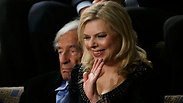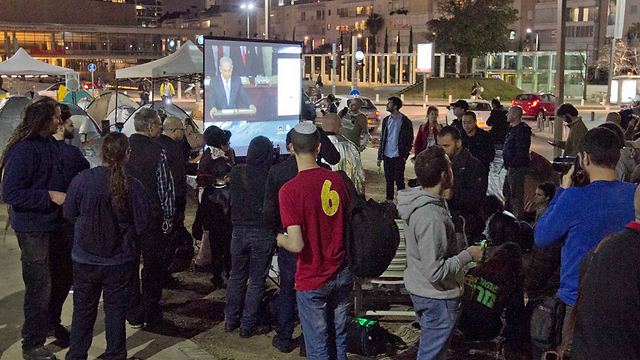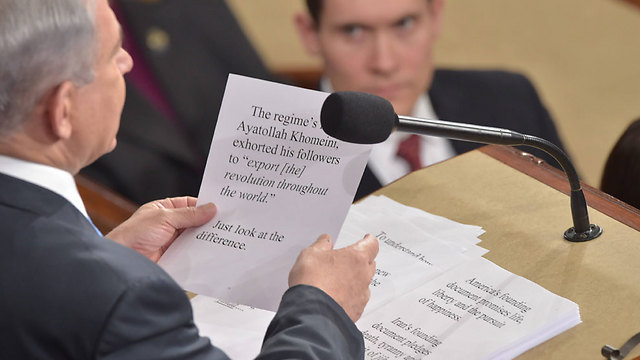
Netanyahu was preaching to the choir
Op-ed: Despite his attempts to butter up the American public with Biblical references and home-grown phrases, Netanyahu failed to find new buyers for his aging snake oil; if not for disingenuous GOP applause, his speech would have fallen on deaf ears.
Prime Minister Benjamin Netanyahu’s much anticipated joint session address to the US Congress went off exactly as planned: A room packed full of pro-Israel supporters applauded dotingly as Netanyahu made make the same claims and deliver the same sound bites he’s been spouting for years. He did not fail to come through for his American supporters.
Platitudes and pleasantries soon gave way to Biblical references, which deteriorated into the inevitable Holocaust reference intertwined with abrasive alliterations reportedly penned by Netanyahu’s ambassador to the US (“goons in Gaza”, “lackeys in Lebanon” and “tentacles of terror”).
These rhetorical tools were not intended to sugarcoat the tough truth for American ears, but rather justify the hype preceding what was effectively a Republican governor - in this case, from the proud state of Israel - attempting to make a case against the sitting president in an election year for the former.
Solid and sound as Netanyahu’s case might or might not be - it was just the crystallization of the truly fundamental differences in orientation between his hawkish realism and Obama’s dogmatic pragmatism. Comparing the Islamic State terror group to the Islamic Republic of Iran might play well in the headlines, but the analogy falls apart under closer inspection. If only ISIS were aiming for a spot on the UN or a chance to host the Olympics.
Regardless, there was not a soul in that room that did not know exactly where Netanyahu stands, what his arguments were going to be, or what he truly thinks of Obama’s foreign policy.
The novelty of Netanyahu’s center-stage performances, which Israelis usually fall for only when given abroad, has faded. As impressive as his English might be, and as well as he does deliver speeches, in reality, inasmuch as the claim his speech was intended to sway public opinion or US policy holds water, Netanyahu came off as used car salesman in a new suit, regurgitating arguments he has made countless of times to little or no effect.
Though Netanyahu has been in power for six consecutive years, and has claimed Iran as his number one priority, the Islamic republic has made significant headway during this period - both in terms of its nuclear program and in terms of strengthening its regional hold, as Netanyahu himself has repeatedly claimed.
This is no coincidence, Netanyahu thrives on the ether he pumps; he creates an atmosphere of inaccuracies, vulgarization and at times even lies which foster a political culture of threats and innuendos that can then only be addressed through politicians like himself.
In much the same way as he cites the UN’s nuclear watchdog only to belittle its inspectors seconds afterwards, or praise Obama and Kerry as staunch Israel supporters only to demean their efforts into a “bad deal”-”no deal” dichotomy, he tries to convince the Israeli public he has flown across the Atlantic to persuade the American public. A public that, if it didn’t have an opinion before, must have surely formed one along partisan lines in recent weeks, a phenomenon that Netanyahu must now mend through a series of interviews to US media.
Thus it was no surprise his AIPAC speech the day before his appearance at Congress was already full of attempts to mend the ailing ties with the US - undoubtedly the biggest victim of Netanyahu’s election spectacle - as indicated by the scheduling of the address, in line with TV prime time in Israel.
It’s election season in Israel and 2016 is around the corner as far as the US is concerned; all sides need to replenish their hawkish pro-Israel credentials, and what better target than Obama’s Iran policy, which Netanyahu claimed was paving the way for an Iranian nuclear bomb.
As Netanyahu neared the end of his remarks in front of what could have been mistaken for a home crowd at a local sports arena, he pivoted to a maddeningly misquoted literary allusion of the “difficult path” once walked by the eminent Robert Frost to illustrate that US and its allies in the negotiations vis-à-vis Iran could only head down two distinct paths – a bad deal and a better deal.
But the prime minister made a mistake usually committed by high school students too lazy to read their assigned material: Frost clearly notes in the second stanza that his chosen course was “just as fair” as the one he missed out on in what Netanyahu referred to as the “fateful crossroads.”
The danger in the allusion – and in Netanyahu’s glaring impatience with prose and misunderstanding of the author’s intent, as much as his general disregard of details – lies in the snake oil the Likud leader tried to sell the Americans. The prime minister does not have an outline of the “better deal” he offered to such rapturous applause; he presented no concrete evidence that, ten years down the line, the world will come to regret the path it walked on Iran.

Netanyahu, for his part, ignores that and other components of the poem which do not match his set agenda. The three-term prime minister, in his desperate attempts to connect to the American audience, forgets the poem is one of an expression of regret – a normative human tendency to blow out of proportions minor events in one’s history.
The worrying potential of a nuclear-armed Iran, which could to set off an atomic arms race in one of the least stable regions in the world, is not behind us. It is still an obstacle the Western world hopes to address before the Middle East deteriorates to a series of minor cold wars, backed by unstable regimes armed with nuclear weapons.
That is one path the region could follow, a path that Netanyahu unwittingly advanced by throwing the grenade of partisan politics into the room and pretending that raucous applause from Republicans was a signal of bipartisan support.
If Netanyahu wants to "be telling this with a sigh / Somewhere ages and ages hence," he should return to ensuring the safety and survival of the Jewish state through diplomacy and domestic reform, because coming to the House which built American politics to misquote a beloved American poem will not stop Iran – but it might harm American support for Israel in the international arena or behind the scenes.
To quote Clint Eastwood, another American cultural hero, who unlike Frost, came from Netanyahu’s side of the aisle: "Mr. Prime Minister, don’t piss on my back and tell me it’s raining."
Conducting a speech before a group of staunch supporters, who agreed with every word you said before it even left your mouth, during prime time in Israel, two weeks ahead of an elections, has very little to do with Iran or the Jewish people’s survival.
Omer Benjakob and Roei Eisenberg are editors at Ynetnews











